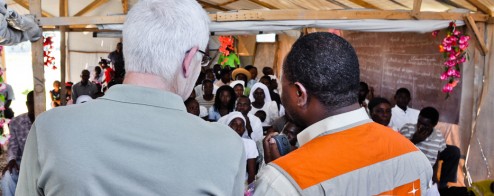 There has been a lot written recently about finding God’s calling on your life. It generally centres around finding out what makes you come alive and then going out and doing it. The common line is that where your gifts and the world’s needs collide, there lies your calling.
There has been a lot written recently about finding God’s calling on your life. It generally centres around finding out what makes you come alive and then going out and doing it. The common line is that where your gifts and the world’s needs collide, there lies your calling.
Now there is nothing wrong with that idea. God has clearly given everyone certain gifts, and it is our responsibility to use them for the good of the world. This is where meaning and purpose in our lives is found. When we are using our gifts and talents for the good of the world, we are contributing to things eternal. I have been affirmed by different people that I have a gift in writing. If I then use that gift for the purpose of furthering my own ego (“gee, he’s a great writer isn’t he”) then it is not furthering the common good (although God could still use it), and it won’t satisfy.
There is something that doesn’t sit right with me though about all the talk of finding God’s calling and doing what makes you come alive. The idea of doing what makes you come alive is, I think, largely a Western one. It is an idea born of privilege. Millions of people don’t have the opportunity to do what makes them come alive because they’re trying to stay alive. For the majority of the world, finding God’s call on their lives never comes to mind. Martin Luther King made this point when he said that for those stuck in the mire of poverty, “it is the struggle to have clean water, breathe clean air and have clean energy, to eat fresh, untainted food from organic soil; to live in harmony with the earth and live in peace with their neighbours; to actualise their God-given potential to make the world a better place.”
What this does is give us greater responsibility to use our gifts wisely. Luke 12:48 says that for those to whom much has been given, much is expected. We have been given much in the Western world. Millions of us in the West have the opportunity in our lives to live out our full potential. That’s why I think one of the saddest things in life is wasted talent; people who have such potential but get to the end of their lives never having realised it. I remember a pastor of mine talking years ago about a conversation he had with an elderly man. The man was talking to my pastor about the blink of an eye that our life is in the scheme of existence. He described it as waking up one morning and you’re 65 years old, and your life has gone just like the click of your fingers.
When you’re young you don’t think about such things. And many of us spend our whole lives letting ourselves be distracted by the constant entertainment served up to us. As Walter Brueggemann says so powerfully in The Prophetic Imagination, we are so satiated that we don’t realise we are wasting our lives riding down a river of purposelessness.
So what is the best way we can discern what our call is, apart from realising what your gifts are and using them to meet the needs of a broken world? Rich Stearns, President of World Vision US, describes it well in his recent book, Unfinished. Here is some of what he says:
My belief is that every follower of Christ, regardless of who they are and what they might be doing currently, was meant to participate in this kingdom work; in other words, we have all been called into this mission of Christ. We all have the same general assignment, but our specific roles within it will be unique to us as individuals and will take into account our gifts and talents, experience, assets, physical location, and our connections.
As I have traveled around the world telling my own story of calling, I can’t tell you how many people have come up to me to ask how they can find God’s calling on their lives.
This is a very serious and personal matter for each of us as followers of Christ, and I certainly don’t have the corner on how someone else can discern God’s calling. But I do think there are some helpful steps, derived from Scripture, that can bring greater clarity to this universal longing.
Six Ways to find God’s Calling on Your Life:
1. Commit – This first step toward discerning God’s calling on our lives is the most difficult because it involves dying to self. It means putting everything else aside in order to put God first. This gets to the heart of who is in control of our lives – us or him.
2. Pray – Prayer is the method, and the Holy Spirit is the mechanism whereby God has given us the ability to discern his direction in our lives. If you are confused about what God expects of you, pray.
3. Prepare – We have the entirety of Scripture at our disposal, and the wise counsel of fellow believers. Scripture provides for us the bigger blueprint for what God is doing in the world, and it gives us all the principles we need to live our lives in his service. Fellow Christians can offer guidance, insight, correction, practical tools, and great encouragement to us as we seek to discern God’s will for our lives.
4. Obey – The Great Commission defined what making disciples entailed: “teaching them to obey everything I have commanded” (Matt. 28:20, emphasis mine).
Disciples are known by their obedience. “Do not merely listen to the word, and so deceive yourselves. Do what it says” (James 1:22).
5. Act – As you look through the lens of God’s kingdom rescue mission and in the context of your own gifts and abilities, what is it that needs doing that you can do? It is time to act. Earl Palmer observed, “God can’t steer a parked car.” Commit to serving him without conditions and move in the direction of your gifts and your passions, trusting that God will steer and lead.
6. Trust – We cannot say that the place where we are stationed, the task that is before us, is insignificant to the larger mission. We are to trust that only God knows the full significance of the role he has called us to play in his greater mission.
 I like what Stearns says. I like it because it is genuine. He is someone who has lived a life of privilege and has chosen to give it up to serve the poorest people on the planet. His first point is perhaps the most important (maybe that’s why he put it first!). Calling is first and foremost about being totally committed to Jesus. If you want to know what God’s will for your life is, follow Jesus. That is God’s will.
I like what Stearns says. I like it because it is genuine. He is someone who has lived a life of privilege and has chosen to give it up to serve the poorest people on the planet. His first point is perhaps the most important (maybe that’s why he put it first!). Calling is first and foremost about being totally committed to Jesus. If you want to know what God’s will for your life is, follow Jesus. That is God’s will.
Another good analogy I have heard about being in God’s will is something Tim Hein suggested many years ago. We often think God has a distinct plan for our life. I don’t believe that. As long as we are following Jesus with all our heart, we are in God’s will. God can then be trusted to use the gifts we have for the good of the world. Hein described it as being in a large paddock sand walking forwards. We can move forward in a straight line, or we can move over to different sides of the paddock, as long as we are moving forward. There are different things we can do with our lives, different directions we can take. As long as our main direction is forwards though, we are on the right track and that is our calling.
Let’s never forget though that the idea of calling is a privilege for us. every human being deserves to have the freedom to pursue their calling. The ugly reality of life though is different for the majority of the world. Our role as affluent Christians is to use our calling to allow others to find theirs.




I agree Nils.
Although I just posted about sensing a new direction in my life – so a bit awkward.
I agree I dont think there is a single purpose for each of us.
Perhaps its like a river – and our challenge is to remove ourselves and our ambitions enough to hear where we are supposed to go. That power comes when we operate as we have been designed, rather than how we desire.